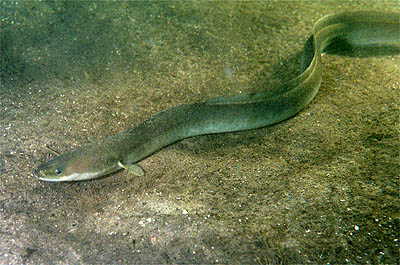Critter of the Month - European Eel
Interview with
The illusive and critically endangered European eel features as our critter of the month.

Find out more
Anguilla anguilla, information on the
IUCN Red List
Hi. My name's Dan Laffoley. I'm marine vice chair of the World Commission for Protected Areas for IUCN, that's the International Union for the Conservation of Nature. And my critter of the month is the eel.
Now why might you ask, the eel? You're probably familiar with it in terms of a muddy stream or estuary, but the eel really is an ocean champion and really epitomises the challenge we have with protecting the seas.
When it's ready to spawn, it leaves the estuaries, goes into the sea, stops feeding, it even changes its shape, its eyes get bigger, and its colour gets different so it can be disguised as it goes on perhaps a 4000 mile migration to the Sargasso Sea.
And in this amazing floating golden rainforest in the North Atlantic, that's where new eels are spawned and born. And then over the next 7-11 months, they drift back slowly towards the UK and finally transit back into the estuaries.
And they're ocean champions because they tell us that the ocean and the land are connected. And they very much reflect in what I try and do in my role globally which is try and explain why the 70% of the earth covered by the ocean really matters. And in a sense, like the eels, so we are dependent on the ocean.
For every breath we take, and every sip of water we drink it links us back to the seas. And in a sense the eels shows us that if there's no blue there's no green. If we didn't have the ocean we wouldn't have eels.
Eels also epitomise the challenge we have to conserve a species that is so dependent both in terms of freshwater and in terms of marine waters.
And that really brings home to us the challenge we face in terms of understanding just what the ocean does for us and in understanding that we need to care so much more for the ocean if we're going to have a bright future on planet earth.










Comments
Add a comment